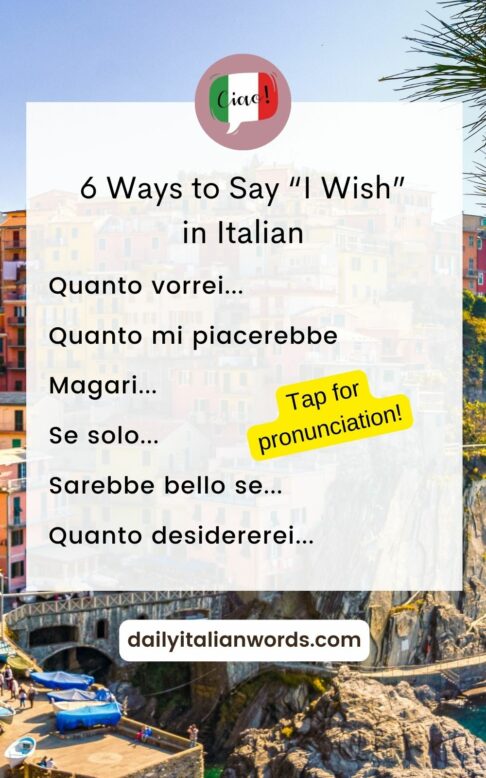In English, we often use the phrase “I wish…” to convey a strong desire or hope for something that is unlikely to happen or is impossible.
In Italian, there isn’t a single direct translation for “I wish,” so we have to use a variety of alternative expressions that convey a similar meaning. Below you will find the six most common translations.

(Quanto) vorrei…
Vorrei, which is the conditional form of the verb volere (to want), means “I would like” in Italian. It is mostly used in formal situations to make polite requests, but can also be used to express desires that may or may not be fulfilled.
Vorrei vedere il Signor Rossi.
I wish to see Mr. Rossi.
To add emphasis in Italian, you can place the adverb quanto (how much/many) in front of vorrei.
Quanto vorrei andare al mare!
I wish I could go to the sea!
(Literally “How I’d like to go to the sea!”)
(Quanto) mi piacerebbe…
Mi piacerebbe also means “I would like” or more literally, “it would please me,” and it is commonly used to express desires that are realistically achievable.
However, if you want to introduce the idea that the desire might not or cannot be fulfilled, you can place the adverb quanto in front of mi piacerebbe. This modification suggests a certain level of uncertainty or difficulty in realising the desire.
Quanto mi piacerebbe vedere la faccia di Elia quando apre il regalo!
(How) I wish I could see Elia’s face when he opens his present!
Magari…
The word magari, which means perhaps or maybe, is often translated as “I wish” or “if only” if it is followed by the subjunctive. It must be followed by the imperfect subjunctive to express a wish in the present or the past subjunctive to refer to a wish in the past.
Magari vivessi in Italia!
I wish I lived in Italy!
Magari avessi vissuto in Italia!
I wish I had lived in Italy!
Se solo…
Se solo quite literally means “if only” and is used much in the same way as its English equivalent.
Se solo avessi studiato di più…
I wish / If only I’d studied more…
Sarebbe bello se… / Sarebbe stato bello se…
Sarebbe bello se literally means “it would be nice if” and is often used to express wishes that can or cannot be fulfilled. Sarebbe stato bello se, on the other hand, always refers to a past regret. Remember that the verb that follows se must be in the subjunctive mood!
Sarebbe bello se potessi perdere peso.
It would be nice if I could lose weight.
I wish I could lose weight.
Sarebbe stato bello se avessimo potuto andare con voi.
It would have been nice if we could have gone with you.
I wish we could have gone with you.
Note that Italians commonly use Sarebbe stato bello without the se, and followed by the infinitive verb.
Sarebbe stato bello andare con voi.
It would have been nice to go with you.
I wish we could have gone with you.
(Quanto) desidererei…
Desidererei, which is the conditional form of desiderare (to desire), is the least used of all the options here, and also the most polite and formal. It is used in the same way as vorrei. Once again, you can place quanto in front to add a touch of emphasis.
Ah, quanto desidererei essere lì con te.
Ah, how I wish I were there with you.


Heather Broster is a graduate with honours in linguistics from the University of Western Ontario. She is an aspiring polyglot, proficient in English and Italian, as well as Japanese, Welsh, and French to varying degrees of fluency. Originally from Toronto, Heather has resided in various countries, notably Italy for a period of six years. Her primary focus lies in the fields of language acquisition, education, and bilingual instruction.


